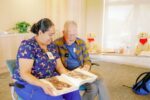(Ezras Cholim) – The mitzvah of Bikur Cholim is based on the Biblical commandments to walking in G-d’s merciful ways, and to love your fellow as you love your self. Just as G-D visited Abraham when he was recuperating from his circumcision, so are we also obligated to visit and encourage the sick.
The Talmud Nedarim 40a relates that when a student of Rabbi Akiva fell ill and no one visited him he drew near to death. Rabbi Akiva and his then students visited him and cleaned his room and cared for him. This caused him to recover. The student told Rabbi Akiva that he saved his life. This incident formed the basis of Rabbi Akiva ruling that to not visit the sick is as if one killed them. Visiting the sick is a religious obligation to save life.
Bava Metzia 30b states that visiting the sick takes away one sixtieth of one’s illness. Moreover, the Mishna states that visiting the sick is a mitzvah whose principle reward is in the World to Come. The Talmud also interprets Psalms 41:2 that one who visits the sick will be saved from Gehenom. In a similar vein, the Talmud also relates how two brothers who were jesters, by making sad people laugh and using humor to end arguments between two parties they merited the World to Come. Certainly bringing joy and comfort to a suffering patient can not only do a world of good for the patient, but will also be of help for those who do this great mitzvah in earning the eternal world..
Visiting the Sick According to the Holy Shaloh
(See Chabad.org article on Bikur Cholim)
Rabbi Yeshayahu Horowitz, the holy Shaloh, writes that the commandment of visiting the sick involves three components: with one’s body (beguf), with one’s soul (benefesh) and with one’s money (bemamon).
- With one’s body: Not only should you pay a personal visit, but you should also do actual things which will uplift the spirit and the comfort of the patient. This can be accomplished in a number of ways; bringing him material to read, bringing her food (especially if the patient is in a hospital where she might avoid eating many of the foods due to kashrut concerns), helping raise or lower the bed, brightening up the room, etc. When a patient is in a hospital, there are more opportunities for doing this aspect, since nurses do not always have enough time to deal with patients. [As mentioned earlier, one must use common sense, and not overstay a visit, or visit at inopportune times.]
- With one’s soul: by praying and saying Psalms for the sick. Don’t forget to wish and bless the sick with a speedy recovery (“refuah sheleimah”) before leaving. Rabbi Moshe Isserles, the Rema, writes that a person who visits the sick and does not pray for him has not fulfilled this commandment. The Talmud3 states that one who is able to pray for the sick and does not is called a sinner. [Thus, if Psalms are being said in synagogue for a sick person, it is important to participate.]
- With one’s money: If the sick person is having financial difficulties covering his medical expenses, then one should help him. This also will help bring the sick person a bit of peace of mind. [It would seem to me that included in this component would be giving charity on behalf of the sick person.]
This post has been contributed by a third party. The opinions, facts and any media content are presented solely by the author, and JewishPhoenix assumes no responsibility for them. MORE













































































